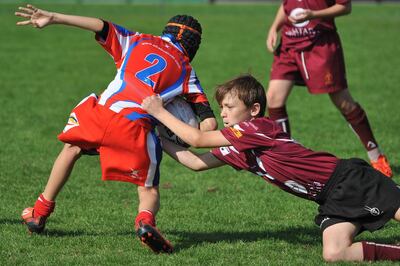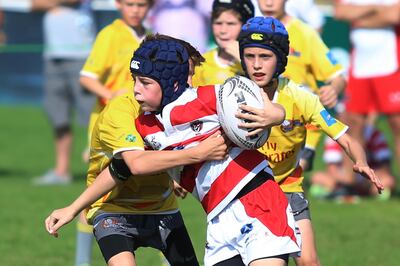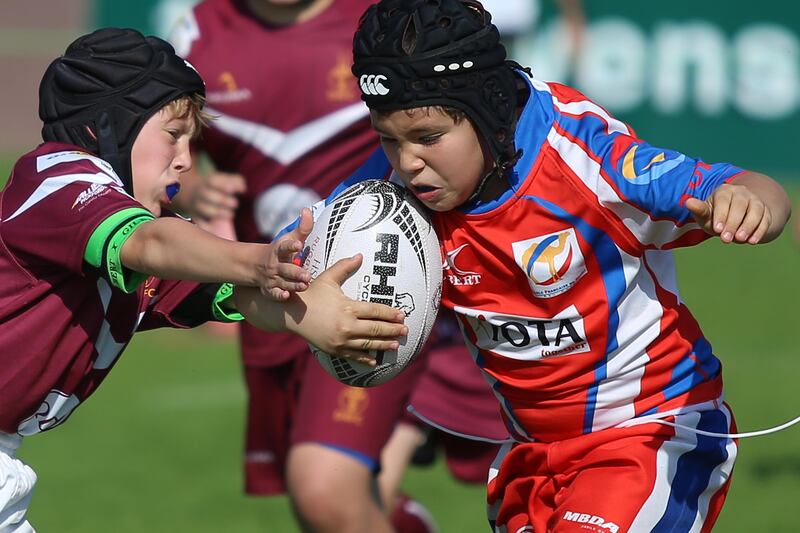Rugby coaches, ranging from World Cup-winner Graham Henry to teachers in the UAE, have voiced doubts about the recommendation that tackling be outlawed from the school game.
The results of a study in the UK released last month, which also received widespread publicity in rugby-playing countries elsewhere, called for a ban on tackling and scrums in school rugby.
Evidence was presented to the UK’s chief medical officers recommending contact be removed in order to reduce the risk of head and neck injuries, and concussion.
World Rugby subsequently termed the conclusions “extreme” and “alarmist”.
______________________________________
Read more:
Ben Bolger: UAE and Abu Dhabi Harlequins captain retires due to concussion
Sharjah Wanderers at 40: Ex-players jetting in for festivities in for a 'very pleasant surprise'
Watch: Dubai Exiles last-gasp try ruled out as Jebel Ali Dragons win tight affair
______________________________________
Henry, a former schoolteacher who was coach when New Zealand won the World Cup in 2011, said it may be beneficial for children to learn safe techniques even earlier than they already do.
“I’m all for trying to make the game as safe as possible,” Henry said, speaking in Dubai. “The dropping of the tackle height, the strict refereeing of that, the concussion protocols, the more they can ensure the game is safe, the better the game will be.
“Not having the tackle and scrum at school level, is that going to help? It is easy to say those things, and make a song and dance about it, but is that actually going to help the situation?
“There is a school of thought that kids should start tackling at five, because if they do, they’ll be better at it.

“It’s like riding a bike. If you don’t start riding a bike until you’re 10, it is quite difficult. If you start at three or four, it is easier, as kids learn quicker when they are younger.”
Robin Giles, the director of rugby overseeing both Dubai English Speaking School and Dubai English Speaking College, agrees with the idea that learning at a younger age could be valuable.
“Research suggests that concussion is reduced by increased competence in completing the tackle; so the better you are at the skill, the safer you will be,” Giles said.
“If you then look at how long and how many hours it takes to become competent at a skill, it is understandable to think that we need more time practicing tackling. Especially when the impacts are considerably more manageable when children are small.”
Young children are generally introduced to the sport via non-contact versions like touch and tag rugby.
Jacques Benade, the director of rugby at Dubai College, as well as Dubai Exiles, doubts the merits of some of the introductory versions of the game.
“I’m a big believer that you can’t take [contact] out of school rugby,” Benade said. “If you take it out, when are you going to start?
“My biggest issue is about coaching the right technique. Clubs and schools have volunteers coaching the age-groups, but the boys need to be coached the right technique to make sure they are comfortable with that.
“In my honest opinion, I do think they learn the wrong technique because of tag rugby. The feet are not close to the body, there is a hand grabbing out, then suddenly the next step is making the tackle. I would take that out, and play two-hand touch from an early age.”
Benade currently introduces tackling at Under-9 level, and he believes that is a suitable age to learn.

“In New Zealand, there is a lot of emphasis on technique,” he said. “Elsewhere, it can be a case of picking up a [tackle] bag, hit it as hard as you can, then now you can tackle.
“I’m passionate about rugby. If you take the contact out of it, I don’t know if you are going to lose kids or gain kids, but how are you suddenly going to learn it later on when kids are going to be bigger?”
Mike McFarlane is the coach of West Asia’s No 1 senior side, Abu Dhabi Harlequins, and also coaches all the age groups at British School Al Khubairat.
He believes all options should be considered for teaching children tackling, including classifying them by weight rather than age, so long as the emphasis is always on technique.

“In terms of contact and collision sports, some children need it,” McFarlane said “Also, it is the game of rugby, and that is why we love it.
“In the northern hemisphere, we went looking for big players and ignored skills. Now it has gone full circle. If you look at southern hemisphere players – children, adults, internationals – what separates them is their skill set.
“With our very top Under-11s, we would go through tackle technique, but that would not be live. It would be technique-based, building up to Year 7.”






